THE PROJECT FOR THE COUNTRY DETERMINES THE EDUCATIVE SYSTEM (REFLECTIONS OF THE OLD TEACHER)
Abstract
The text approaches the relation between the Project for the Country (PC) – what a nation proposes to be – and the Educative System (ES). The question is: how do we determine the contents or knowledge that the school transmits? The ES is a political tool ruled by the PC. The contents to be transmitted derive from this project. Therefore, the syllabus ends up being the PC. What is learned in the ES is the music sheet or the norm that guides the behavior of the citizens in this project. There are neither autonomous contents nor autonomous learning experiences. They are not indifferent or independent, either, but derive from and are supported by the PC. Thus, the syllabus (or set of contents) anticipates the history that will be lived, and operates as a libretto of the future. Education without political framing and anchorage runs the risk of becoming mere social action, even though it may be generous. The relation between the PC and the ES becomes even more noticeable and is more demanded in the case of universities. Where do the universities obtain the knowledge to be taught? From the needs and problems to be solved, according to what is defined by the PC. A country may go through several PC’s. It may imply changes in the nature and goals of the university. A different university corresponds to each PC. This is clear in the case of the Project developed in Argentina in the 80’s (European influence). Where do the universities get the validity of what they teach if there is no project?


